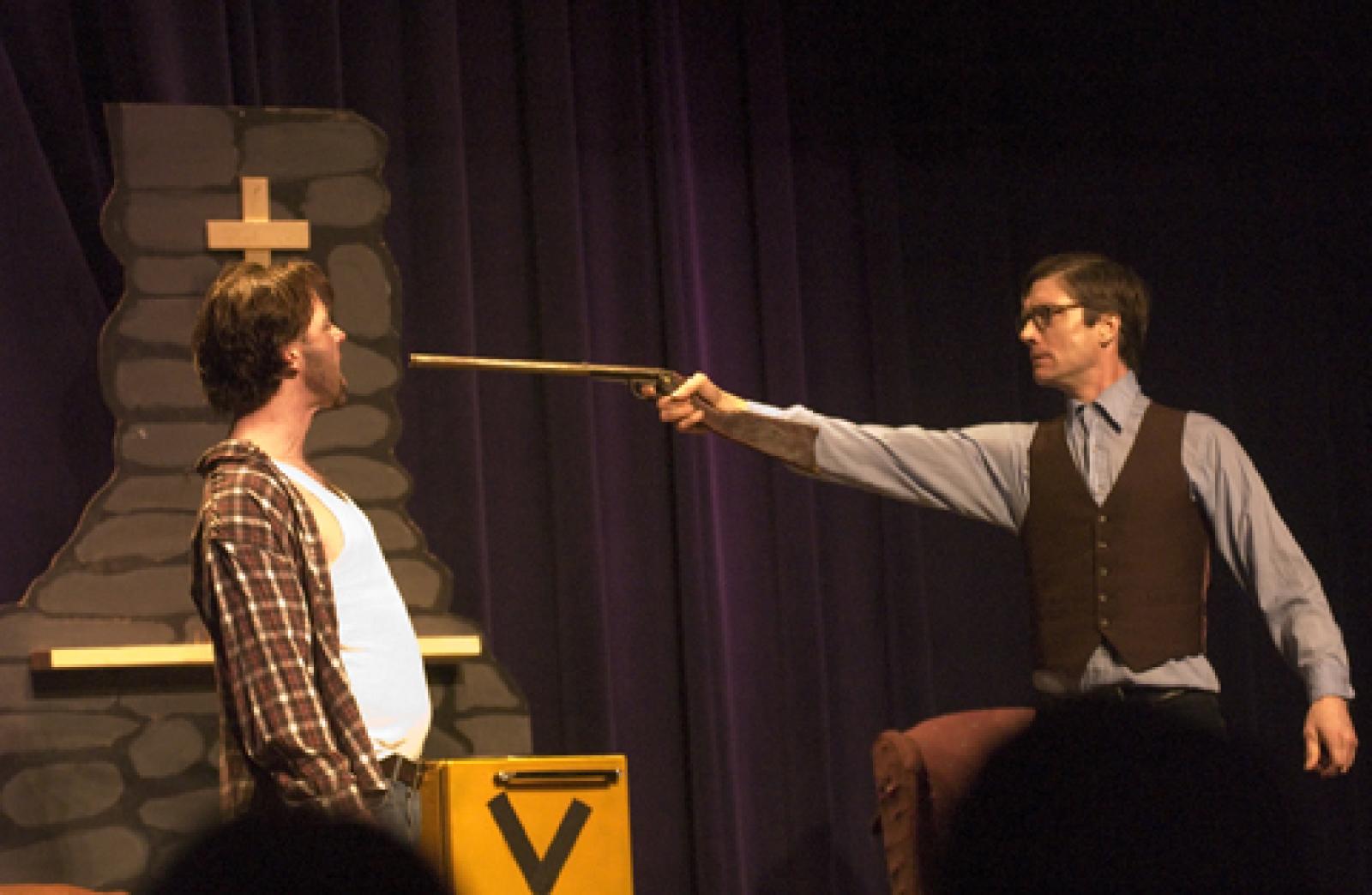The audience at the Katharine Cornell starts tittering the moment Coleman Conner (Chris Brophy) swaggers onstage. Hips thrust forward, jaw slack, malevolent halfwit eyes groping around the room for something to steal or mangle, he manages to make his trip from the doorway to the liquor cabinet into one continuous promise: we are in for a treat.
Directed by Kristian Seney, The Lonesome West production is raising money for local radio station WVVY (93.7 FM) and delighting viewers. The production returns to Vineyard Haven at 8 p.m. tonight, Friday, March 6, playing at Che’s Lounge off of Main street. Admission is $10.
Set in the rural Irish town of Leenane, in County Galway, in the mid 1990s, The Lonesome West is the third in a trio of plays by Martin McDonagh (writer and director of In Bruges).
The props on the stage: a liquor bottle, a crucifix, a gun and a collection of figurines indicate the major themes of the play before the characters set foot on stage. Alcoholism, Catholicism, violence, and the idolatrous worship of material objects, all intertwine in one disturbing portrait of big emotions trapped in a very small town.
The four-person cast is composed of the brothers Coleman and Valene Conner, a schoolgirl named Girleen (Katherine Pilcher), and a skittish, desperately unhappy priest called Father Welsh (Xavier Powers).
Come to mention it, everyone in this play is desperately unhappy. Life is held very, very cheap (the back-story of the play is that Coleman shot his own father for insulting his haircut), and no one can seem quite to make out whether staying alive is worth it at all. In the middle of all this unstoppable apathy, the characters have intense passion for insignificant physical objects: stoves, figurines, bags of chips, items from mail-order catalogues. It seems there is a lot of love, only it is being desperately misplaced.
The upshot of all this? The play is hilarious.
Its shades of light and dark shift madly and disconcertingly over the stage and across the audience, who are drawn into the slapstick nihilism with alarming readiness. Much of the reason for this is the language of the play, which is as brilliant as it is filthy. Phrases like “He’d steal the shite out of a burning pig!” are delivered in commendably realistic Irish accents
The plot follows Father Welsh’s crisis of faith and self as he struggles to restore the love between brothers who’ve been at each other’s throats for years.
Body language and costuming does most of the characterization for the two brothers before they even speak. Meyer’s angular, erect posture and neat shirt and jacket let us know exactly how fastidious and self-righteous he is, just as Brophy’s perpetual sullen slouch, unkempt hair, and undershirt signal how little he has to lose. Most scenes end in, or at least include a violent ballet between the two. The two actors masterfully co-produce the sense of seething tension that slowly balloons out in each scene, threatening at any moment to explode.
Power’s Father Walsh’s stooping, nervous movements likewise go a long way toward expressing his inner anguish. Feeling himself to be failing in his priestly duties (he has already presided over two murders and a suicide among his flock), he is beset by religious doubt, which Girleen and the two brothers enjoy poking fun at.
Incapable of wielding moral authority, Father Welsh is often left whining that “No one listens to me!” He also experiences the real psychic anguish brought on by trying to be intellectually honest, and yet it is unclear whether all of his self-flagellation is really making the situation any better.
Girleen occupies a middle place in this spectrum. As filthy-tongued and irreverent as the brothers, she also has the basic compassion they lack. Beautifully acted by Pilcher, the moments when Girleen drops her jaded hussy act to reveal the young woman underneath, desperately yearning for happiness, are the most beautiful in the play.
The reason she can find for staying alive is that, “At least you still have the chance of being happy, when you are living, unlike the dead.” It is difficult to say whether this delicate thread of hope is going to be enough to pull her through the play’s crisis, but it seems to be the redemptive, earnest kernel in a play that holds nothing sacred.
At the play’s end, it is still an open question whether or not the two brothers will learn to get along. They have managed to find themselves in agreement on exactly two points: one, that they hope a girl from the rival under-twelves soccer team will “relapse into her coma and die,” and two, that the nuns they see at a funeral are hot. Still, it’s something.
The Lonesome West is playing again this Friday, March 6, at Che’s Lounge off Main street in Vineyard Haven at 8 p.m. Tickets are $10 each and can be purchased at Mocha Mott’s, Above-ground Records, Island Entertainment or at the door. All proceeds will be donated to WVVY 93.7 Martha’s Vineyard community radio.






Comments
Comment policy »